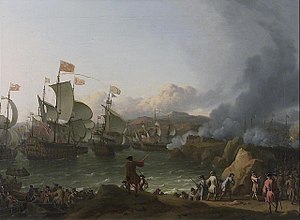Battle of Vigo Bay
| Battle of Vigo Bay | |||||||
|---|---|---|---|---|---|---|---|
| Part of the War of the Spanish Succession | |||||||
 The Battle of Vigo Bay, by Ludolf Backhuysen |
|||||||
|
|||||||
| Belligerents | |||||||
|
|
|
||||||
| Commanders and leaders | |||||||
|
|
|
||||||
| Strength | |||||||
| 25 ships of the line + frigates and fireships> |
15 French ships of the line 3 Spanish galleons + frigates, fireships, and transports |
||||||
| Casualties and losses | |||||||
| ~200 killed | All ships burnt or captured ~2,000 killed |
||||||
The Battle of Vigo Bay, also known as the Battle of Rande (Galician: A Batalla de Rande; Spanish: Batalla de Rande) was a naval engagement fought on 23 October 1702 during the opening years of the War of the Spanish Succession. The engagement followed an Anglo-Dutch attempt to capture the Spanish port of Cádiz in September in an effort to secure a naval base in the Iberian Peninsula. From this station the Allies had hoped to conduct operations in the western Mediterranean Sea, particularly against the French at Toulon. The amphibious assault, however, had proved a disaster, but as Admiral George Rooke retreated home in early October, he received news that the Spanish treasure fleet from America, laden with silver and merchandise, had entered Vigo Bay in northern Spain. Philips van Almonde convinced Rooke to attack the treasure ships, despite the lateness of the year and the fact that the vessels were protected by French ships-of-the-line.
The engagement was an overwhelming naval success for the Allies: the entire French escort fleet, under the command of Château-Renault, together with the Spanish galleons and transports under Manuel de Velasco, had either been captured or destroyed. Yet because most of the treasure had been off-loaded before the attack, capturing the bulk of the silver cargo had eluded Rooke. Nevertheless, the victory was a welcome boost to Allied morale and had helped persuade the Portuguese King, Peter II, to abandon his earlier treaty with the French, and join the Grand Alliance.
...
Wikipedia
